Flinders University is proud to be hosting the annual conference of the Australian Historical Association in 2024.
The local organising committee of historians from the University’s College of Humanities, Arts and Social Sciences is excited to welcome historians from around Australia and the world to Adelaide on Kaurna Country to share their new research and to engage one another on the pressing questions facing our discipline and our communities.
Excitingly there is a GLAM and Public History Stream in which PHA members are encouraged to submit proposals.
What is the current state of public history in Australia? Have we reached a moment where notions of ‘public’ and ‘scholarly' history no longer describe an increasingly fluid world where historians with university training are employed throughout the public sector, while academics strive to make an impact with their research and engage meaningfully with communities? Is it time to develop more nuanced ways of understanding the work of the twenty-first century historian? If so, what ‘home truths’ must we wrestle with as we use our critical and creative faculties to ensure ‘history' maintains both its relevance and ‘reinventive doubleness’?
While the discipline of history was once the flagship of many ‘sandstone’ humanities offerings in the academy, the last two decades have witnessed such a contraction of history courses, tenured positions and student enrolments that Australians now consume most of their history via screen stories, museums, journalism, trade books, family history and heritage experiences. These circumstances, coupled with the democratising impulses of the so-called digital revolution, have done much to deepen public understandings of the past and history as a practice; however, they have also destabilised the ‘authority’ of the historian at a time when sensitive historical truths remain contested, and much careful reckoning is still required.
Within this GLAM & "Public” History stream of the 2024 ‘Home Truths’ conference we will take stock of the past, present and future of ‘history-making’ in Australia, wrestle with ‘home truths’ relating to AI and historical imagination, First-Nation history practices and funding, disciplinary ‘watch-dogs' and media debates, as we reach toward new understandings of our work as twenty-first century history-makers.
Sponsored by the History Trust of South Australia, whose tagline is ‘Giving the Past a Future Now’, we invite proposals which meditate upon the shifting intersections between ‘public’ and ‘scholarly’ practices’, the evolving nature of history-making and our increasingly diverse publics. Papers or panels which engage with the following themes or ideas are particularly welcome: Behind the Scenes - Screen Stories & Streaming histories?: How is history being ‘done’ on the big screen and various streaming services? How do those working in this area negotiate the demands of historical accuracy with the need to engage audiences with compelling characters and convincing narrative arcs? What sort of ‘truths’ about the past are being privileged, why and how?
‘GLAMorous HomeTruths?’: For several decades, Galleries, Libraries, Archives and Museums professionals have been reckoning with the complex legacies of their institutions, sources and cultural practices. Across Australia, institutions have been active in repatriation, reconciliation, recruitment, and reorienting their stories to shift power systems and public perception. But how successful has this been? And what must these institutions reckon with if they are to ‘house’ for contested historical truths?
Tangible and Intangible Heritage & History?: How are historical skills being used to deepen public understandings of heritage, be that the statues in our public squares, the rapidly disappearing artisan trades of the 19th and 20th centuries or the interplay between museum collections and First Nation and migrant songs and stories? What role could and should historians play in heritage debates - including those involving contested development initiatives? Should we foster more collaboration between and across the history and heritage worlds? If so, how might we do so in ways that best honours the important distinctions between these disciplines?
